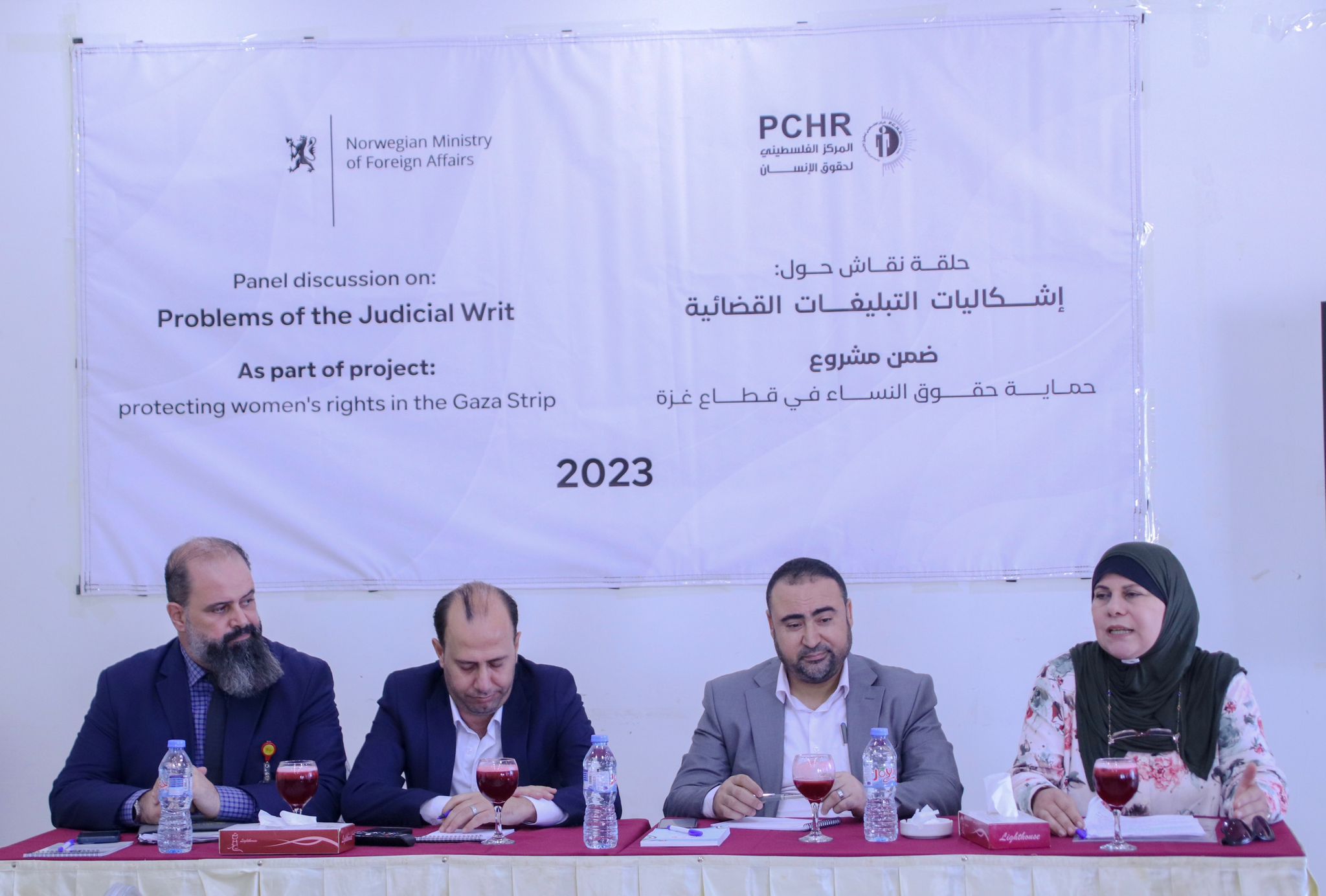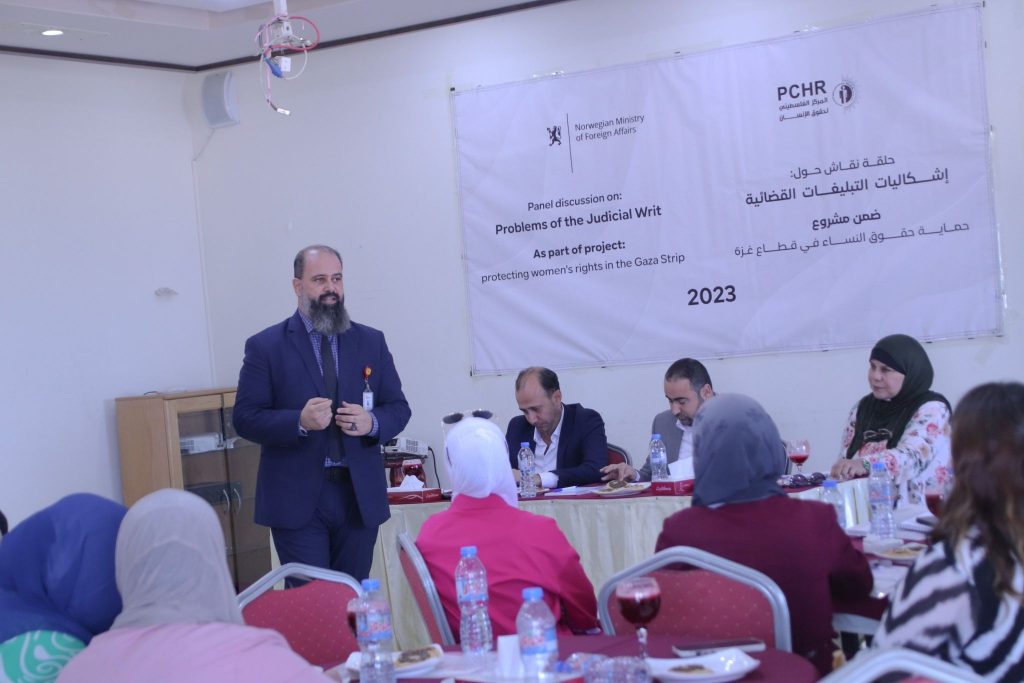
Ref: 48/2023
Date: 29 August 2023
On Monday, 28 August 2023, the Women’s Unit at the Palestinian Centre for Human Rights (PCHR) organized a panel discussion on “Challenges of Judicial Notifications” as part of the advocacy campaign: “Alimony is My Right”. The panel discussion was attended by representatives of the High Shari’a Judicial Council, governmental bodies, and civil society organizations (CSOs) for women and child rights.
Majidah Shehadah, Deputy Director of Women’s Unit at PCHR, inaugurated the panel discussion and welcomed the attendees, saying it is part of the advocacy campaign “Alimony is My Right”, which aims at empowering and helping women to obtain their alimony payments as stipulated by law. She added that the idea of the panel discussion came out of the Women Unit’s work and legal representation of women before Sharia courts; during which, it has monitoredthe challenges of delayed judicial notifications and how they hinder swift justice delivery, inflict harm on women while collecting their alimony, and negatively affect their lives and human dignity. Shehadah affirmed depriving women and children of their alimony payments means they lose an essential source of protection that shall be provided to them.
Ghada al-Nazli, lawyer at the Women’s Unit, made an intervention and reviewedthe challenges of judicial notifications, including not delivering the hearing notifications or receiving them days after the hearing. She added there is another challenge about the notifiers not providing a correct legal statement on some of the judicial notifications. Al-Nazli called for identifying the causes of these challenges and finding solutions to them in order to reduce the lengthy litigation and lift harm inflicted on women.
Mr. Yousef al-Shanti, Director General of the Sharia Courts, stressed the importance of this discussion, adding that the Shari’a Judicial Council held several training courses for the new notifiers, but constantly changing them prevent them from gaining the sufficient legal experience. Al-Shanti also talked about the mechanism used by the High Shari’a Judicial Council to follow up complaints related to judicial notifications as well as the council’s assessment of the quality and speed of judicial notifications.
Moreover, representatives of the company responsible for delivering the judicial notifications reviewed the obstacles facing the notifiers in field, most notably the latter’s inexperience of judicial notifications in Shari’a courts. They concluded that they are fully willing to implement the concluding recommendations of the panel discussion.
At the end of the panel, there was a considerable discussion, during which the participants made the following recommendations:

TANGIBLE INFORMATION ABOUT CHRISTMAS LOAN FOR PLANNING…
This is not a normal post that you see every day on the internet where people give fake testimonials and false information about huge financial assistance.. I am aware that many of you have been scammed and that fake agents have taken advantage of those seeking loans. I will not call this a normal testimonial, I will call this a situation where I am a living witness of how you can get your loan when you meet the terms and conditions of the company. It really does not matter if you have a good credit rating or government approval, all you need is a valid ID card and a valid IBAN number to be able to apply for a loan with an interest rate of 3%. The minimum amount is 1000 euros and the maximum amount that can be borrowed is 100,000,000 euros. I give you a 100% guarantee that you can get your loan through this reliable and honest company, they operate 24 hours online and provide loans to all citizens of Europe and outside Europe. They sent me a document that was verified and tested as valid before I got the loan, so I invite anyone who needs a loan to visit them or contact them via
Email: michaelgardloanoffice@gmail.com
WhatsApp for Europe: +385915608706
WhatsApp for USA: +1 (717) 826-3251
After contacting them, let them know that Ms. Dejana Ivica from Zagreb gave you the information. Seeing is believing and you will thank me later when you get a loan from them. I made a promise that after I get a loan from them, I will announce the good news to everyone online. If you have friends or relatives, including colleagues, you can tell them about this offer and that it is happening this CHRISTMAS TIME.
… [Trackback]
[…] Info on that Topic: pchrgaza.org/womens-unit-holds-panel-discussion-on-challenges-of-judicial-notifications-2/ […]
HIRE A FASTEST CYBER RECOVERY EXPERT TO RECOVER YOUR LOST OR STOLEN BITCOIN/ETH/USDT/ THE HACKANGELS
I simply want to share my story about THE HACKANGELS RECOVERY EXPERT. To all of you out there. One has to be careful. A lot of scammers are out there taking money from innocent traders. I was a victim of these crypto scammers. They made me lose my hard earned funds. The best thing that happened to me this year was seeing an article about THE HACKANGELS RECOVERY EXPERT. A professional hacker and private investigator. I invested $954,300 in a cryptocurrency platform and it turned out to be a scam and I had no idea how to get my money back until I reached out to a recovery company called THE HACKANGELS RECOVERY EXPERT. I explained my situation to them. I was shocked to hear that they had recovered all of my stolen cryptocurrency in just 48 hours. I said that I will not hold this to myself but share it to the public so that all scammed victims can get their funds back. To anyone who may find themselves in a similar unfortunate situation. I highly recommend THE HACKANGELS RECOVERY EXPERT. Quickly reach out to them on their hotline:
WhatsApp: (+1(520)200-2320
Email: support@thehackangels.com
Web: www.thehackangels.com
If you’re in London, you can even visit them in person at their office located at 45-46 Red Lion Street, London WC1R 4PF, UK. They’re super helpful and really know their stuff! Don’t hesitate to reach out if you need help.
… [Trackback]
[…] Find More Info here to that Topic: pchrgaza.org/womens-unit-holds-panel-discussion-on-challenges-of-judicial-notifications-2/ […]
… [Trackback]
[…] Find More Info here to that Topic: pchrgaza.org/womens-unit-holds-panel-discussion-on-challenges-of-judicial-notifications-2/ […]
… [Trackback]
[…] Information to that Topic: pchrgaza.org/womens-unit-holds-panel-discussion-on-challenges-of-judicial-notifications-2/ […]
I am out here to speed this good news to the entire world on how I got help from Dr UYI a great lottery spell caster that will help you cast a lottery spell and give you the rightful numbers to win the lottery, I didn’t believe lottery spell at first but as life got harder i decided to give a try, I spend so much money on tickets just to make sure I win. until the day I met Dr UYI online, which so many people have talked good about, that he is very great when it comes to casting lottery spell, he told me the necessary things to do and behold it was like a magic, i won $220 Million Dollars Mega Million with the numbers Dr UYI gave to me. his a really trustful person worthy and reliable, i am sharing this to you who have been finding it so hard to win the lottery, Thanks you Dr UYI who helped me Contact him via email: drzukalottospelltemple@gmail.com OR WhatsApp on +17174154115